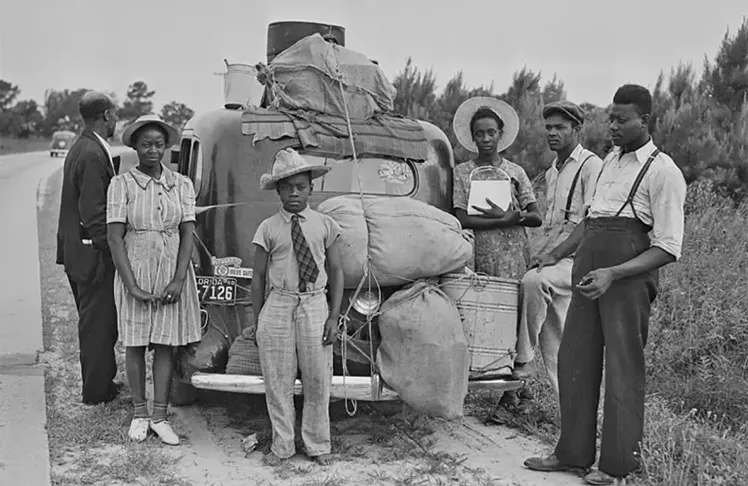
by Levi Perrin
This commentary is part of Unerased | Black Women Speak’s December exploration, Claiming Our Space: Preserving Our Future.
For centuries, the South has been a space of contradiction for Black Americans — both a home rich with history and culture and a land marked by systemic oppression.
The Great Migration was a solution. Millions of Black people, escaping Jim Crow discrimination, racial violence, and economic exploitation, sought better lives in Northern and Western cities. They transformed those places into cultural and political powerhouses.

Over the past few decades, the tide has turned. The New Great Migration, a reverse flow of Black people back to the South, is reshaping the region.
I am one of those migrants. A seventh-generation South Carolinian, I grew up steeped in the South’s traditions and complexities. Like many of my peers, I left after college, relocating to the D.C. area for opportunities that felt out of reach at home. Seven years later, I relocated to New Orleans.
More than reclaiming my roots, the decision solidified my agency in shaping what the South can be, returning to a familiar place while claiming my space and preserving my future.
The reasons for returning vary, but many revolve around opportunity, family, and culture.
Many northern cities are grappling with job loss, gentrification, and soaring costs of living. In contrast, the South offers lower costs, higher quality of life, and the chance to own homes and businesses.
New York Times columnist Charles Blow argues in his book “The Devil You Know: A Black Power Manifesto” that this movement is a political strategy. “If Black people simply returned to the South, they could significantly increase their own political power,” Blow writes. “It’s about consolidating power in states where we can lead and reshape the future.”
The impact is already visible. Georgia, with its growing Black population, played a decisive role in the 2020 presidential election and flipped control of the U.S. Senate. The South’s demographic shift is seeding Black political power to influence state governance and national policies.
For others, the move is about nurturing a cultural legacy. Black Southerners carry a deep connection to the region’s traditions — its music, food, and community ethos.
“Moving back to the South felt like reclaiming my history,” says Michelle Carter, a Dallas-based high school educator who returned after spending years in Chicago. “There’s something powerful about walking on land where your ancestors fought to survive and knowing that you’re part of that story. It’s grounding in a way I didn’t expect.”
Carter also sees the move as a way to protect and build on the cultural assets of her community. “I’ve started volunteering with local groups that focus on preserving Black neighborhoods and schools. It feels like part of my responsibility — not just to honor the past but to create opportunities for the next generation.”
The South is also where Black resilience shines. Cities like New Orleans and Atlanta have become epicenters for Black excellence, blending tradition with innovation. From music to tech startups, Black Southerners are redefining what it means to thrive.
It’s not about running away from problems in the North. – Tasha Williams
Of course, racism and inequity persist in the South, as they do across the U.S. Yet, many returning Black Southerners see their migration as a way to confront these challenges head-on.
“It’s not about running away from problems in the North,” says Tasha Williams, a Charlotte-based project manager in the tech industry. “It’s about creating solutions where we have a say — where our voices matter.”
Williams says moving to Charlotte has allowed her to be closer to her family while also investing in a region where her contributions feel impactful. “I joined a local advocacy group focused on increasing voter turnout in Black neighborhoods,” she says. “It’s amazing to see how much of a difference we can make when we focus our efforts in places where we’re not just participants — we’re leaders.”
For Williams, Carter, and the legions of us who return, it’s not about romanticizing the South. It’s about reimagining it.
During the 20th Century Great Migration, our ancestors fled the South in search of safety and opportunity. This reverse migration is about reclamation. Today, we’re returning on our own terms, with the power to shape the region for us and our children.
The New Great Migration is a testament to the staying power of Black culture and resilience. It’s about joy and justice — about knowing that we deserve to be here and to thrive.
By returning to our roots, we are not just building a life for ourselves — we are preserving the stories, the struggles, and the triumphs of our ancestors while carving out space for generations yet to come.
In a country that has long tried to dictate where Black people belong, moving back to the South is a powerful statement: we belong wherever we choose, and we are here to claim it.
Joshua Levi Perrin is a writer for Unerased | Black Women Speak.















